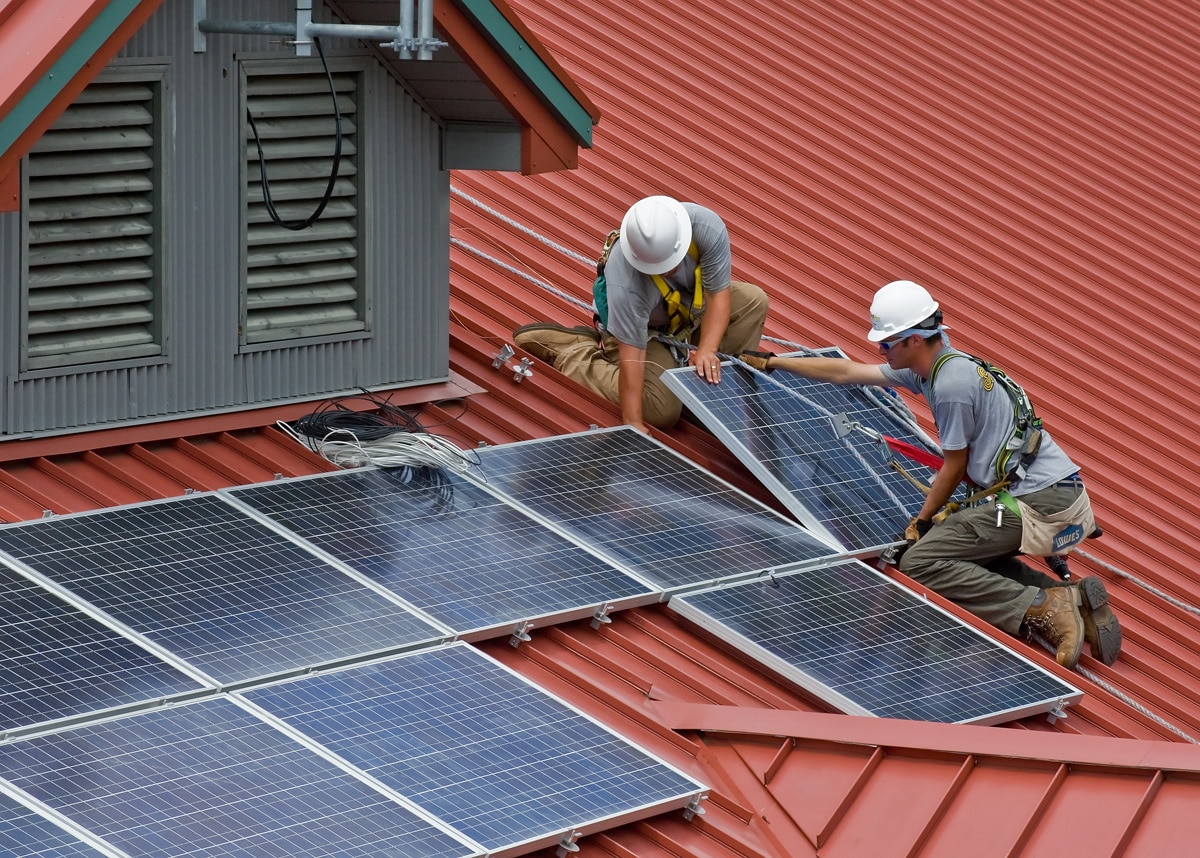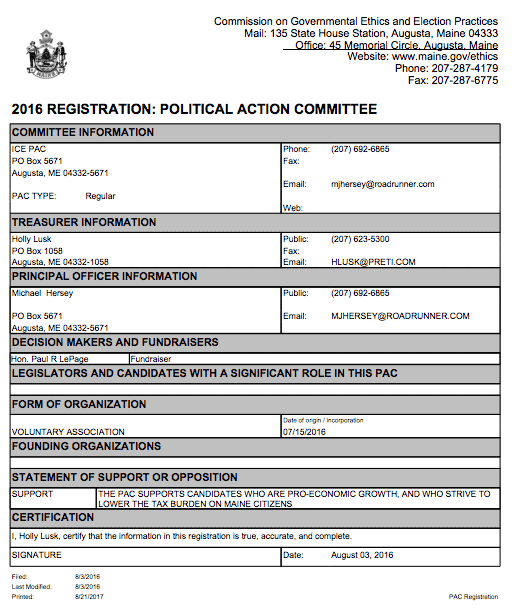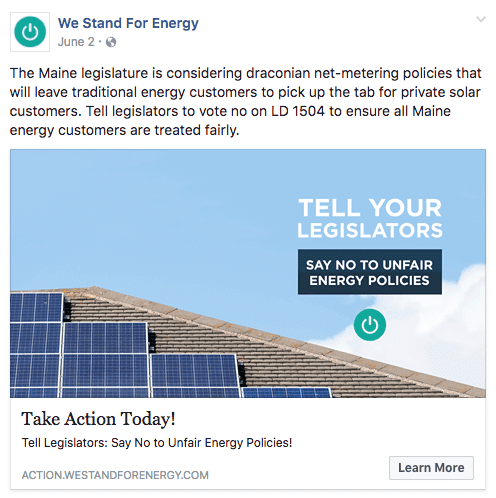How Central Maine Power killed a popular pro-rooftop solar bill

Central Maine Power used its money and political influence to kill a pro-rooftop solar bill that was supported by a majority of state legislators, with the help of Governor Paul LePage and some Republican lawmakers.
The utility, which is a subsidiary of Avangrid, has secured (for now) the phase-out of Maine’s popular net metering program for rooftop solar. LePage appointees on the Maine Public Utility Commission ordered the phase out in a controversial February of 2017 decision. In response, the Maine House and Senate passed a bill – LD 1504 – to save net metering and also expand participation in community solar farms. But Gov. LePage soon vetoed the bipartisan pro-solar bill, and members of the Republican minority in the House of Representatives later voted in sufficient number to sustain the governor’s veto.
Below are some ways that Central Maine Power worked behind the scenes in 2017 to rig the debate over rooftop solar and net metering in its favor:
Central Maine Power contributed money to Paul LePage’s political action committee
On October 14, 2016, Patrick Woodcock, then the director of Governor LePage’s Energy Office, testified in favor of dismantling Maine’s net metering program before the Maine Public Utilities Commission (PUC). Richard Hevey and Eric Stinneford of Central Maine Power were also present at the hearing.
Just ten days later, on October 27, Central Maine Power’s Political Action Committee (CMP PAC) made a campaign contribution of $1,000 to Governor LePage’s ICE PAC, which channeled corporate contributions to help support the election of Republicans to Maine’s state legislature. Joel Harrington, a Central Maine Power lobbyist, serves as an officer for the CMP PAC, which “supports candidates that we believe are in the interest of our organization.”

The Governor’s Energy Office also submitted written comments about net metering to the PUC on October 12 and again on November 2.
Central Maine Power sponsored a Republican Party fundraiser with Curt Schilling
On May 10, 2017, the Maine House Energy, Utilities, and Technology Committee heard testimony on the pro-rooftop solar bill, LD 1504. Joel Harrington, the lobbyist for Central Maine Power, testified against the bill. Also there to oppose to the bill were James LaBrecque, Governor LePage’s Technical Advisor on Energy, and Angela Monroe, the new acting director of the Governor’s Energy Office.
Just five days later, the CMP PAC contributed $1,000 to the Maine Republican Party’s 2017 Chairman’s Reception, which was held on May 31st, 2017. The fundraiser featured Curt Schilling, the former Red Sox star turned paid speaker and pundit for the alt-right Breitbart News, as well as Governor LePage and the Maine House Republican Leader Ken Fredette. Sponsorship at the $1,000 level entitled Central Maine Power and other donors to attend a “Private Reception” at the event, according to a flier.

One day after the fundraiser, on June 1, Republicans on the Maine House Committee On Energy, Utilities and Technology mounted opposition to the pro-solar bill. Some had previously supported the bill.
CMP PAC’s strategic sponsorship of the Maine Republican Party’s 2017 Chairman’s Reception represents its only reported political contribution of 2017, as of the time this article was published.
Central Maine Power lobbied legislators to kill the pro-solar bill
In late June, an amended version of the pro-solar LD 1504 was passed by the Maine House and Senate with veto-proof bipartisan majorities. LePage vetoed the bill on July 10, and Central Maine Power’s lobbyists got to work pressuring Republicans who had voted for LD 1504 to switch their votes and sustain the governor’s veto. In early August, a final vote in the Maine House fell just a few votes short of overriding LePage’s veto. Central Maine Power’s had flipped enough Republican legislators – the utility had won its battle against rooftop solar and net metering for the time being.
Central Maine Power’s hired lobbyists Jim Mitchell and Josh Tardy, both from the firm Mitchell Tardy Jackson, reported $3,100 in lobbying expenditures on LD 1504 for July, and another $2,200 for August.
“To protect and promote your organization’s interests in Augusta, you want experienced professionals with extensive networks of relationships among policymakers, their staff and their political confidantes,” Mitchell Tardy Jackson’s web site tells clients. “You demand not simply the names of key people but the nuances and historical connections that can significantly influence political decision-making.”
Lobbyist Josh Tardy’s bio on the website meets that description. Tardy previously served in the Republican leadership in the Maine House. He’s been mentioned as a possible Republican candidate for governor in 2018, a reminder that Central Maine Power’s political influence could endure in Augusta beyond the end of LePage’s term-limited tenure as governor.
Another of Central Maine Power’s hired lobbyists, Alexandra Serra of Serra Public Affairs, reported $3,000 in lobbying expenditures on LD 1504 for July, but hasn’t yet reported lobbying totals for August (lobbying reports for August aren’t due until September 15). About a week after the Maine House’s failure to override LePage’s veto, Serra announced a new addition to her lobbying team: Lauren LePage, the daughter of Paul LePage who once served in her father’s administration.
Joel Harrington, the Central Main Power lobbyist, also reported lobbying on the pro-solar bill in July, but did not disclose a dollar amount (Maine does not require lobbying expenditures for under $1,000 on specific bills to be reported).
Central Maine Power brought in front groups to support its anti-rooftop solar campaign
Central Maine Power’s bid to kill the pro-solar bill was backed by We Stand for Energy, a front group run by the Washington, DC-based Edison Electric Institute (EEI), the industry association that represents the nation’s investor owned electric utilities. We Stand for Energy’s attacks on LD 1504 included a Facebook post and since deleted online action alert that targeted state legislators. EEI’s front group decried “draconian net metering policies” and urged Mainers to “tell legislators to vote no on LD 1504” or suffer the alleged consequences.

EEI’s multi-state campaign against net metering programs for rooftop solar was the subject of a recent New York Times investigation. While EEI has long claimed that net metering results in a cost shift that benefits utility customers who go solar but burdens other customers, a 2017 study by the Lawrence Berkeley National Laboratory suggests these claims may amount to much ado about little or nothing. Similarly, a Brookings Institute review of net metering studies from a number of states – including Maine – confirmed these rooftop solar programs generate net benefits for all utility customers. Brookings summarized the results from Maine as follows:
Another study commissioned by the Maine Public Utility Commission in 2015 put a value of $0.33 per kWh on energy generated by distributed solar, compared to the average retail price of $0.13 per kWh — the rate at which electricity is sold to residential customers as well as the rate at which distributed solar is compensated. The study concludes that solar power provides a substantial public benefit because it reduces electricity prices due to the displacement of more expensive power sources, reduces air and climate pollution, reduces costs for the electric grid system, reduces the need to build more power plants to meet peak demand, stabilizes prices, and promotes energy security. These avoided costs represent a net benefit for non-solar ratepayers.
Central Maine Power and EEI were also joined in their campaign against Maine’s pro-solar bill by the Consumer Energy Alliance, which, contrary to its name, actually represents a long list of fossil fuel, industrial, and utility interests that includes EEI. Consumer Energy Alliance has used shady tactics to attack rooftop solar policies in other states. The group discussed its pro-pipeline and anti-rooftop solar campaigns at a March 2017 meeting held at ConocoPhillips offices in Washington, DC – just another indicator of who it really represents.
What’s next for rooftop solar and net metering in Maine?
Central Maine Power’s strategy for attacking Maine’s net metering program for rooftop solar has relied on the utility’s key political ally, Governor Paul LePage. It’s a risky strategy that aligns Central Maine Power’s public image with a controversial governor known nationally for his harmful rhetoric. LePage’s term-limited tenure as governor will come to an end after the 2018 elections, when Mainer’s will get to choose a new governor and Central Maine Power’s Political Action Committee will undoubtedly seek to use campaign cash to secure the utility’s political influence in Augusta.
Rooftop solar supporters aren’t taking their latest loss on net metering sitting down. The Conservation Law Foundation and others have launched a legal challenge to undo the Maine Public Utility Commission’s phase out of net metering, and clean energy supporters in the state legislature remain confident that solar will win in the end – it just may take a while longer to get there.



